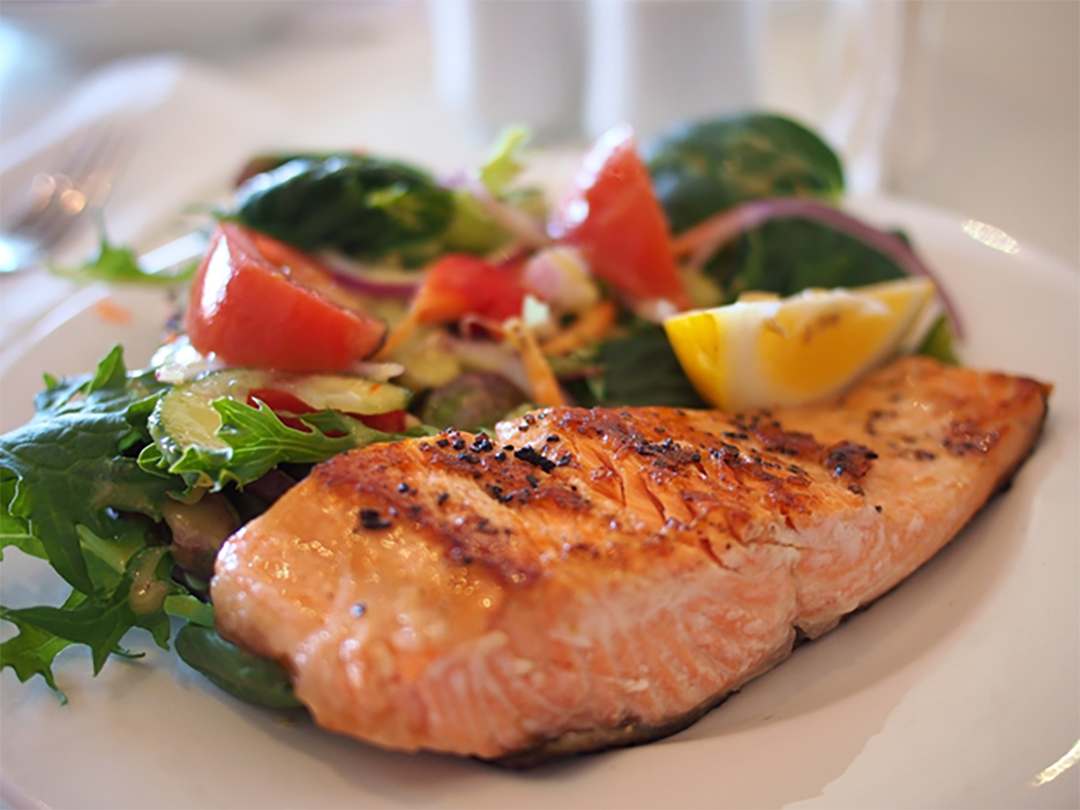
Fish
Fish is an excellent alternative to red meat due to its nutrient-rich composition and numerous health benefits. Lots of different kinds of seafood are high in lean protein so they help maintain muscle mass without the saturated fats found in red meat. Its lower calorie count assists in weight management too. Most fish are packed with Omega-3 fatty acids, essential fats that support heart health, reduce inflammation, and improve brain function. They also contain a wealth of vitamins, including vitamin D and B2, and minerals like calcium, phosphorus, iron, zinc, iodine, magnesium, and potassium.
Moreover, the American Heart Association recommends eating fish like salmon, mackerel, herring, lake trout, sardines, and albacore tuna twice a week because of their high Omega-3 content. So, by incorporating fish into your diet, you’re not just cutting back on red meat but also introducing a powerhouse of essential nutrients into your meal plan. Make the switch to fish for a healthier, heartier alternative!
Poultry
Poultry, encompassing chicken, turkey, and other bird meats, is another fantastic alternative to red meat. Notably lower in saturated fat compared to red meat, poultry is a great source of lean protein which assists in building and maintaining muscle mass. It also provides a significant amount of essential vitamins and minerals, such as vitamin B6, niacin, and selenium. These nutrients support the body’s cellular health, improve immune function, and enhance metabolic efficiency.
Moreover, poultry is quite versatile and can be prepared in a multitude of ways, ensuring that your meals stay exciting and varied. By substituting red meat with poultry, you’re choosing a healthier option without compromising on taste or nutrition. So why not try some chicken or turkey in your next meal? You might be surprised at how satisfying and flavorful it can be!
Plant-based Proteins
You can also get a lot of necessary protein from plants, so make it count. Here are some popular choices for this:
- Legumes
- Nuts
- Tofu and tempeh
- Edamame
- Plant-based powders
- Nutritional yeast
- Seitan (wheat meat)
- Soy products
- Spirulina
Firstly, they’re packed with fiber, which aids in digestion and promotes heart health. This is a nutrient that you won’t find in animal proteins. Secondly, plant-based proteins are lower in calories and saturated fats, helping to maintain a healthy weight and lower cholesterol levels. They also include essential nutrients such as vitamins, minerals, and antioxidants that contribute to overall health and well-being.
Lastly, a plant-based diet can reduce our environmental footprint, as it requires less land, water, and energy compared to a diet rich in red meat. Therefore, making the switch to plant-based proteins is not just good for you, but also for our planet.
Nuts and Seeds
Nuts and seeds are brimming with heart-healthy fats, proteins, and a range of beneficial vitamins and minerals. The high protein content aids in maintaining muscle mass, similar to red meat. However, the bonus here is the presence of unsaturated fats, which, unlike the saturated fats in red meat, help to lower cholesterol levels and reduce the risk of heart disease.
They are also rich in fiber, which aids digestion and promotes a feeling of fullness, assisting in weight management. Furthermore, the antioxidant properties found in many nuts and seeds help in combating oxidative stress in the body. So, include a handful of assorted nuts or seeds in your diet daily for a nutrient-rich, health-boosting alternative to red meat.
Dairy and Alternatives
Dairy is rich in calcium, vital for strong bones and teeth, and a source of high-quality protein, contributing to muscle building and repair. Many products also contain essential nutrients like vitamins D, B2, and B12, and minerals such as potassium and iodine.
For those seeking dairy-free options, alternatives like almond, soy, and oat milk also provide beneficial nutrients. These alternatives often come fortified with calcium and vitamin B12, ensuring you don’t miss out on these vital nutrients. Moreover, they contain less saturated fat than red meat, helping maintain heart health. Hence, dairy and its alternatives present a nutritional powerhouse, delivering a substantial nutrient punch, while maintaining a balanced diet and reducing red meat intake.
Eggs
These amazing products are rich in high-quality protein, which is essential for muscle growth and repair, similar to red meat. However, unlike red meat, eggs are low in saturated fat, reducing the risk of heart disease. Additionally, they contain vital nutrients such as vitamins B2, B12, D, and A, and minerals like selenium and iodine. The choline found in eggs supports brain health, while the antioxidants lutein and zeaxanthin promote eye health.
Since eggs are versatile and can be incorporated into various dishes, they offer a flavorful way to reduce red meat intake. Therefore, substituting red meat with eggs can contribute to a balanced diet while providing essential nutrients for overall health and well-being.
Quinoa and Other Whole Grains
Moreover, these grains are loaded with essential minerals like magnesium, iron, and zinc, and vitamins like B vitamins, which support various bodily functions. Importantly, whole grains, unlike red meat, contain no harmful saturated fats, reducing the risk of heart disease. The protein in quinoa and other whole grains contributes to muscle growth and repair, much like red meat. Therefore, incorporating these nutrient-dense grains into your diet can offer remarkable health benefits while reducing red meat consumption.
So, there you have it! There are plenty of healthy and tasty alternatives to red meat every day. Whether you’re opting for poultry, plant-based proteins, eggs, or whole grains, each offers unique nutritional benefits. Remember, variety is the spice of life, so don’t be afraid to mix things up. Your body (and the planet) will thank you for making these beneficial dietary changes. Happy and healthy eating!
Comments
comments